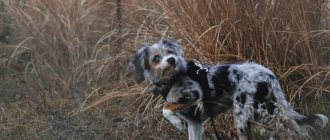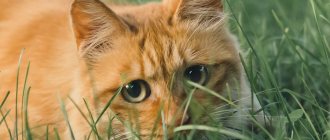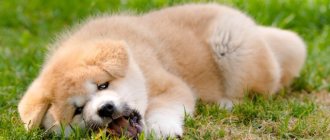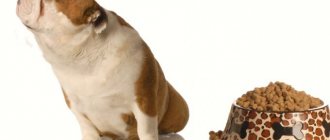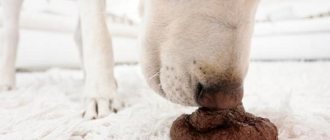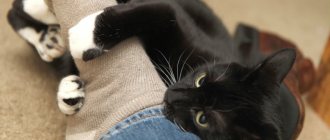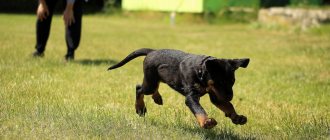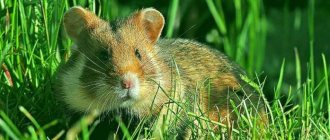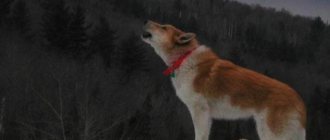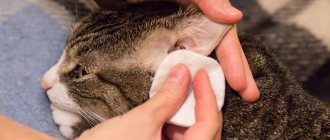Save the article:
You let the dog out for a walk, and he goes straight to the green grass and selflessly eats it? Yes, this happens very often. Some doubt the benefits of such an “event,” while others advocate the necessity and naturalness of the process of eating grass. It turns out really interesting: the grass does not bring vitamins to the body, since it comes out undigested, but the dog eats the grass anyway - let's figure out why they do this and what the consequences may be.
Why does a dog eat grass outside?
Dogs don't like grass so much as they eat it when necessary. They eat mostly wheatgrass, which boasts long, tough leaves. The weed grows not only in parks, forests and meadows, but also on city streets.
What grass does a dog eat if there is no wheatgrass nearby? Pets can eat other plants with hard leaves, incl. sedge, hay. Before swallowing wheatgrass, dogs sniff it and eat it only when they catch the desired smell.
Reason 1. Need for fiber
A dog will eat wheatgrass if its diet is low in fiber. This is the name for dietary fiber, which is not processed in the intestines, but is useful for “good” microflora. Fiber has a good effect on intestinal motility, promoting the release of feces. Therefore, if the body lacks hard fibers, the pet eats grass, which is excreted in the feces.
Reason 2. To cleanse the stomach or intestines
If a dog eats grass and then vomits, it means it needs to cleanse its stomach or intestines. This usually happens when the dog feels unwell, has a stomach ache, ate something wrong and is throwing up.
The hard leaves irritate the stomach and tickle the throat, causing vomiting a few minutes after eating the herb. Sometimes the reaction is delayed and vomiting begins at home. Therefore, you should always have cleaning supplies for dogs on hand.
Sometimes there is no vomiting, and the wheatgrass quickly passes through the digestive tract and exits through the anus, wrapped in mucus. Much to the owner’s surprise, this happens a few minutes after eating the grass, if the dog has emptied before. If not, wheatgrass speeds up the bowel movement process.
Reason 3. Perversion of taste
Sometimes a dog will experience a condition known as “taste perversion.” She has a constant need to eat grass, paper, garbage, feces, and other inedible objects. In this case, the pet must be carefully monitored, otherwise digestive problems may arise - poisoning, intestinal obstruction, worms.
To resolve the issue, take your dog to the doctor. Taste distortion can be caused by poor nutrition. But sometimes the reasons lie deeper and are caused by malfunctions in the brain.
Reason 4. Your pet likes to eat grass.
A dog may eat wheatgrass because he likes the taste and texture. There is nothing wrong with this if there are no signs of illness.
Reason 5. The dog is bored
Another reason why dogs eat grass is because they are bored. This usually happens if the pet is left unattended in the yard for a long time. To keep himself occupied, he chews sticks and other things, and eats grass.
Reason 6. Attracting attention
Dogs crave human communication, and therefore try to attract the owner with various actions, incl. inappropriate. If you do not pay attention to the dog, but react to eating wheatgrass, he may chew it in order to establish contact with the owner.
Analogs from a pet store
Sprouted seeds of cereals and other crops are often sold in pet stores. You can be completely confident in the safety of this greenery. And if your pet doesn’t like the grass, you don’t have to throw it away. Transplant it into a larger pot and use it as a decorative element in your home.
The consultants in the store will tell you which greenback will suit your four-legged friend. They will also advise you on this or that plant if your dog has any health problems.
It would be a good idea to buy greens at any supermarket. This is about:
- Celery: Its stalk has anti-inflammatory properties. Indispensable for older pets suffering from arthritis.
- Parsley: it is rich in manganese, phosphorus, calcium, potassium and folic acid, which is very necessary for the health of dogs. Parsley also helps prevent unpleasant odor from an animal's mouth.
- Dill: since dill has a specific taste, animals do not always agree to eat it. But dill helps increase appetite and improve the functioning of the digestive system and kidneys.
- Basil: It contains vitamins B2 and C, potassium, calcium, iron, folic acid and magnesium. Like dill, basil improves digestion and increases appetite. Some feed manufacturers add basil to their products.
Don't give your wet-nose greens unless you're sure he needs them. It is better to discuss this point with your veterinarian. As a useful additive, you can finely chop dill or parsley in small quantities and add it to the food.
What plants are dangerous for dogs?
Don't let your dog eat wheatgrass:
- along the highway;
- on a heavily polluted street;
- near a working plant, factory or small enterprise that is engaged in hazardous production.
Walk away from planted fields that are treated with pesticides, fertilizers, and rodent poisons. The grass growing here is dangerous for the dog and can cause poisoning.
If you live in a townhouse and treat the area with pesticides, pay attention to whether the product is safe for pets. Buy high-quality drugs that do not harm dogs, cats, people, or birds.
Don't give your dog indoor plants, even if she wants to eat them. They can be toxic to your pet. First of all, this applies to tulips, daffodils, hyacinths, orchids, azaleas, rhododendron, tiger lilies, and foxgloves. Usually the dog won't eat them, but a puppy or young dog who likes to chew sticks may become interested in the flowers and eat the leaves.
What to do?
Accidentally eating grass is not a cause for concern. If your dog eats grass out of boredom or lack of nutrients, that's normal! However, it is advisable to monitor such a habit so that the dog does not get poisoned and find out about the puppy’s illness in time.
- Indoor dogs that don't get much exercise can start eating indoor plants to feel closer to nature. This can be dangerous and even fatal, depending on the type of plant. Avoid growing any potentially poisonous plants.
- If you cannot or do not want to avoid growing plants that are toxic to dogs, keep the plants out of your dog's reach. Or train your dog so he knows which plants or areas in your home or garden are off-limits.
- Never allow your dog to eat grass that has been treated with chemicals, as this can lead to poisoning. Even if you don't use herbicides or pesticides on your own lawn and garden, you have no control over your neighbors' actions. Toxic substances can enter your yard through water runoff or wind. This also applies to public areas, such as parks, where the grass is frequently treated.
- Make sure your dog has enough physical and mental activity every day, giving him more attention will combat boredom and prevent grass eating.
- A sudden increase in grass eating may be a sign that your dog is sick or lacking vital nutrients. Pay attention to your dog's actions so you can discuss them with your veterinarian if necessary.
- Review the ingredients in your dog's food to make sure it truly provides a balanced diet with all the nutrients your pet needs. Switching to foods that are higher in fiber or that improve digestion overall may reduce your pup's need for an herbal supplement.
If your dog consistently eats grass for more than two days in a row and vomits every time, this is a sign that you should take your dog to the vet. Chronic indigestion should be checked out as soon as possible to rule out intestinal parasites such as roundworms or something more serious such as parvovirus or kidney disease. It is very important to promptly give your dog (even if not walking) medications against internal and external parasites that will help protect the dog from ticks, helminths and fleas, such as NexgarD Spectra. It is important that the tablet has the taste and smell of beef stew, which makes it easy to feed it to your pet. Immediately after application, you can resume playing and walking with your dog.
RCV-CAN-0244-2021
What to do to stop your dog from eating grass
If you are concerned about your dog's health when he eats wheatgrass, do the following:
- Review your dog's diet, paying special attention to fiber. Many dog owners have found that their pet stops eating grass when they include vegetables and fruits (cabbage, apples, carrots) in their diet.
- Feed only high-quality food that is beneficial to animals and easily digestible. If the dog is natural, the diet should consist of meat, vegetables, and fruits. When she eats dry food, buy a super premium or holistic product. Never feed economy class food.
- Raw, unpeeled beef stomach (tripe), which contains a huge amount of enzymes that improve digestion, is beneficial for your dog.
- Don't give food from the table or leftovers that you haven't eaten.
- If your dog eats grass out of boredom, play with him and buy toys.
- When walking, pay attention to your pet, not your smartphone.
- Monitor your pet's health.
What grass can an animal eat?
If your pet chews grass, you should carefully choose walking areas. There should be no roads nearby: heavy metals from machine exhausts settle on the vegetation, causing harm to health. The dog can catch an infection and become infected with helminths (worms).
Allow people to eat grass outside the city after receiving the necessary vaccinations.
The most beneficial for dogs are:
- wild cereals (wheatgrass, sow thistle);
- oats or wheat;
- special greens for cats that dogs eat with pleasure;
- carrot tops, beets, chamomile, dill, parsley and others.
They are not mixed with food, but given as a separate treat.
It is recommended to buy seeds in a store and grow them at home. In just three weeks you can pamper your pet with an environmentally friendly product. Consultants will tell you what is best to buy to keep your puppy healthy and happy.
Should you take your dog to the vet?
If your dog eats grass from time to time, this is normal. But if she does this constantly, it is better to consult a doctor, as she may be talking about digestive problems or other diseases. You should be especially wary if, in the absence of grass, in an attempt to induce vomiting, the dog tears and eats paper and pieces of fabric.
If your dog isn't showing any symptoms but you think he's eating too much grass, let him fast for a day. If your pet continues to eat wheatgrass, go to the vet.
See a doctor immediately if your dog not only eats grass, but also has the following symptoms:
- diarrhea;
- vomit;
- weight loss;
- loss of appetite;
- blood in stool;
- frequent licking of lips;
- lethargy.
These signs may indicate various problems, including serious infectious diseases and poisoning. The doctor will make a diagnosis based on blood and urine tests. X-rays and other examinations may be needed.
Herbal medicine for four-legged animals
Not only people are treated with herbs - they are ideal as a gentle therapy for dogs. In some cases, herbs can help faster and more effectively than medications. However, the appropriateness of such treatment must be confirmed by a veterinarian. If a four-legged animal is diagnosed with a serious illness, then traditional medicine fades into the background.
Non-dangerous sores can easily be cured with herbs, but only if you are sure that they will help your animal. Under no circumstances should you give plants that you are not sure are safe. If some infusion or mixture helped you, this does not mean that it will help your dog.
If your pet loves to eat street vegetation, try to walk it away from the roads. It will be much better if you start growing greenflies for your pet yourself. At least you will be sure that it is clean and safe, and if the dog is used to eating grass outside, he will probably stop doing it.
Dogs are real predators
Naturally, dogs eat meat; moreover, it should form the basis of their diet. Despite this, dogs are not considered predators in the strict sense of the word. They are best classified as omnivores (that is, animals that eat both meat and plant foods). It's no secret that dogs, in principle, eat almost everything. Dogs do eat a wide variety of foods, including plants and vegetables. Of course, such an explanation is not enough, especially since it does not reveal the reasons why dogs regurgitate the grass they eat. Let's look at the main nuances of this issue.
Allow or not
Even if you are sure that your dog eats properly and gets everything it needs from food, in my opinion, it is okay to allow your dog to “pinch” the grass. Of course, greens should not be allowed to be consumed as a substitute for the main meal. But nothing bad will happen from a few blades of grass eaten with pleasure. Moreover, many dogs get great pleasure from the taste and smell of this or that herb. It happens that our Jack likes to “get caught” in a clearing and pick another blade of grass. But he does this extremely rarely. Maybe because he already gets enough vegetables and fresh herbs.
FAQ
When should you contact a veterinarian?
If you become particularly interested in grass, observe the behavior and condition of the animal for some time. At least one day. If other symptoms do not appear, then there is no need to worry. But if at the same time something else in the behavior of your tailed friend alarms you, then go to the clinic.
How to stop eating grass?
From my own experience, I will say that it is not at all necessary to wean you off eating grass. When this dog’s behavior bothers you very much, it is possible to wean him off. It is best to limit the dog’s movements and take him out for walks strictly on a short leash. Every time he tries to bite the grass, just pull the leash towards you, and this way he will understand that this cannot be done. You need to continue such walks until the dog develops an absolute habit.
Although now there is a way to keep the dog in check without limiting his freedom of movement. And although I do not support such methods and consider them inhumane, they are effective. We are talking about electric collars. This accessory has a remote control panel, and every time the dog decides to eat grass, press the button on the remote control, as a result of which the dog will receive a small but noticeable electric shock. Just do not overdo it with this method, as it is traumatic for the dog.
When to sound the alarm
Which dog matches a person's zodiac sign?
Animals often try to eat dandelions or celandine. If you can give the first ones without fear, then celandine should be completely excluded. It is not even possible for it to grow near the dog’s place of residence. This is a poisonous plant. Immediately after consumption, harm may not appear, but after some time the animal will become lethargic, refuse food, and may begin to drip saliva from its mouth or vomit. In this case, you should immediately go to the veterinarian so that he can provide the necessary assistance to your pet in a timely manner.
Favorite weed
Favorite weed.
What grass do dogs eat? Usually these are cereals with rather hard and rough long leaves: wheatgrass, sow thistle, hedgehog grass, bluegrass and other meadow grasses. Dogs can gnaw both oat stalks and wheat. And some adherents of vegetarian products extend their interests not only to cereals, but also to other types of plants. For example, they may gnaw carrot or beet leaves in your garden, chew lettuce, or tear off the heads of calendula and cornflowers. The main thing is that the grass is clean and not treated with pesticides.
What zoologists say about eating vegetation
Veterinarians and zoologists advise dog owners to purchase fresh grass in special stores or grow it themselves. They recommend giving it to your pets regularly (every day) to ensure that a sufficient amount of vitamins enters the body.
But do not forget that animals themselves know quite well what they need. Therefore, if your pet repeatedly refuses weed, it means that it is not suitable for him, and therefore you just need to try giving him another one. If he refuses this, then it is better to consult a veterinarian. Perhaps vitamins will need to be given in tablet form, and not in the form of weed.
